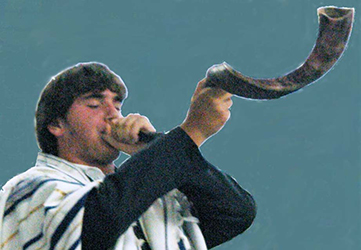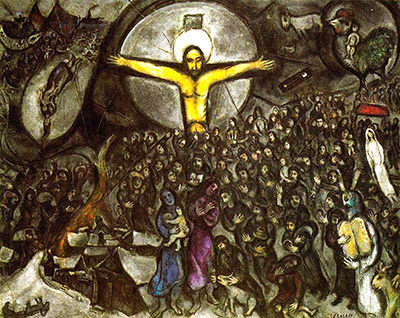Torah: Vayikra (Leviticus) 9:1 — 11:47; Haftarah haChodesh: Ezekiel 45:16 — 46:18
I DELIGHT TO DO YOUR WILL, O MY GOD
This week's Parashah speaks about obedience to God. Regardless how well intentioned are our actions, our deeds, in serving God, they pale in comparison with obedience to Him. God, first and foremost, wants us to listen to Him and to do what He asks us to do. All our good intentions are just dirty rags – “all our righteous deeds are like a filthy garment” says the prophet Yeshayahu 64:6. “The road to perdition is paved with good intentions,” goes the saying.
At the end of the previous Parashah, Aharon and his sons are asked to remain at the Tent of Meeting for seven full days. Now, on the eighth day - Shemini, they are inaugurated in their priestly service with a ceremony of sacrificial service commanded by God through Moshe. A joyous occasion filled with offerings and animal sacrifices; a meaningful service to the LORD. In the end, Aharon, filled with a joyous and grateful spirit, raises his hands and blesses the people, at which moment the Glory of the LORD appears to the entire congregation and the people respond with spontaneous glad songs and worship by falling upon their faces.
But, as if God’s instruction in performing the ceremony was not enough, two of Aharon’s sons, Nadav and Avihu, want to add their own “touch” to it and each takes his fire pan, fills it with incense and brings fire before the LORD under the watchful eyes of the whole congregation of Yisrael. This was not commanded by the LORD, it had no meaning or purpose. What happens next is an astonishing lesson in obedience. “A fire came forth from the LORD and consumed them and they died before the LORD” – Vayikra 10:2. Some may ask, what have they done wrong to deserve this fate? They had good intentions! They were happy that their father was just inaugurated High Priest and wanted to celebrate with their own offering to God.
Some say that they were punished because they brought their own incense and fire not as commanded by the LORD, thus an alien fire. Even though the LORD commanded to bring daily incense, He did not tell Moshe to have it done yet, because the fire should have been a holy fire taken from the altar. Others say that the brothers brought the fire in the Holy of Holies — because it says, before the LORD — where only the High Priest was allowed to enter, thus they were punished for that. Others yet connect the immediately following passage - which at first reading appears to be out of context - with what happened here. Vayikra 10:8-11: “And the LORD spoke to Aharon, saying, ‘Do not drink intoxicating wine, you, nor your sons with you, when you go into the Tent of Meeting, lest you die; it shall be a statute forever throughout your generations. In order that you may differentiate between the holy and the profane, and between the unclean and the pure. And that you may teach the people of Israel all the commandments which the LORD has spoken to them by the hand of Moshe.” Aharon’s sons may have been inebriated thus denigrating the meaning of this holy day; they could not differentiate between the holy and the profane. The LORD wants us to serve Him and proclaim our faith in public by discerning what is holy and what is profane with our faculties not afflicted by any detrimental substance; He wants us to serve Him with a pure mind and body.
Regardless of our understanding of what had happened, Aharon’s sons were not in obedience to God. Their offering may have been sincere but was not commanded by God. It was of their own imagination and the whole congregation was watching. Our forms of worship and service to God, our everyday actions, must be within the teaching of the Bible otherwise we put ourselves above God; we put our actions before obedience to God. In a prophetic utterance King David writes: “Sacrifice and meal offering You have not desired… Burnt offering and sin offering You have not required… I delight to do Your will, O My God; Your Torah is within My heart." Psalms 40:6,8. Later, in the Brit Chadashah, was revealed who spoke these words, our Lord Yeshua (Hebrews 10:5), and if He, being the Son of God, did not take lightly God's will and the only thing He wanted to do was to be in obedience to His Father's will, shouldn't we take to heart the lesson of this Parashah and make our goal, in everything that we do in this life, to be obedient to God, to delight in doing His will and obey His commandments?
The Parashah not incidentally continues with another obedience test, what it is commonly known as “the dietary law.” Vayikra 11:1-4: “And the LORD spoke to Moshe and to Aharon, saying to them, ‘Speak to the people of Yisrael, saying, “These are the creatures which you shall eat among all the animals that are on the earth. Everything among the animals that has a split hoof, which is completely separated, and chews the cud, that one you may eat. But this is what you shall not eat from among those that chew the cud, or of those that have split hooves; the camel, because it chews the cud, but its hoof is not split; it is unclean to you.”
God did not say that these animals are unclean in themselves, but that are unclean to you, to the Jews. And just to make sure we get it, God repeats this phrase – "it is unclean to you" - eight more times in this Parashah, in verses 5,6,7,8,26,27,29 and 31. Why the Jewish believers have to prove themselves to the “Christian" communities as to their faith by eating a ham sandwich when God tells us not to do so? Why people interpret the passage in Acts 10 as being about food when the apostle himself explains that the vision was about the Gentiles being brought into the kehilat Yisrael, the community of Israel, and not about food? “Now on the next day, around the sixth hour, Kefa went up on to the roof to pray. And Kefa became hungry, and was wanting to have a meal; but while they were preparing it, Kefa fell into a trance; and he sees Shomayim having been opened, and a certain object descending like a large linen cloth lowered by four corners upon the ground. In this were all the four-footed animals and creepers of the earth and birds of heaven. And there came a voice to him, "Get up, Kefa, kill and eat!" But Kefa said, "By no means, Adonai! For I have never eaten anything unholy or unclean." And the voice came to Kefa a second time, "What the LORD made clean, you should no longer regard as unclean." And this happened three times; and immediately the object was taken up into Shomayim. Now, while Kefa was greatly perplexed within himself as to what the vision which he saw might be, hinei, the men, who had been sent by Cornelius, and who had, by inquiring, found the house of Shimon, stood at the gate.”
If Kefa, an apostle, was perplexed how can we be so condescending and say that we know better - that it is about food? Isn't it because we put our own desires above God's? Eating is one of the things we do in public, under watchful eyes of our friends, and in which we make a display of our faith, as Aharon's sons did, therefore, isn't our witness as believers jeopardized when we do not respect God's instructions? Not only that, but Yeshua, to be truly the Messiah, kept the Torah perfectly, including not eating unclean animals. Therefore, if we want to be more like Him, we should also behave like Him. Yeshua did not teach Kefa to eat unclean animals, He never declare those animals clean and Kefa did not eat unclean animals, therefore, God’s instructions did not change. What changed was the advent of Moshiah who made clean the hearts of Jews and Gentiles alike, the hearts of everyone who believe and put their trust in Him. That is why Kefa was perplexed, because in the Rabbinic tradition the Gentiles were considered unclean, but now they were made clean by the blood of Moshiah Yeshua.
In 1 Corinthians 8:8-12 we are given a powerful warning: "But food will not commend us to God; we are neither the worse if we do not eat, nor the better if we do eat. But take care that this liberty of yours does not somehow become a stumbling block to the weak... For through your knowledge he who is weak is ruined, the brother for whose sake Messiah died. And so, by sinning against the brethren and wounding their conscience when it is weak, you sin against Messiah." Yeshua came and died for the sins of the entire world but He asked us to be witnesses to the Jewish people first, His brethren in the flesh, even if they do not believe that yet, and if we want to be obedient to God and a witness to the Jewish community, our actions must not be a stumbling block. The message of the sacrificial act of Yeshua must speak to them without any impediment; otherwise we sin not against them but against Yeshua. Even though this passage in Corinthians is not about unclean animals, but about the meat from clean animals but sacrificed to false gods, it can also be applied to any unclean food.
One can argue for the health benefits of these commandments even in our day-and-age when we still can get sick from eating unclean animals, but one thing remains clear, all of God's commandments were given for our own good and today obeying these commandments is a testimony of our obedience to Him. God said that these creatures are unclean to the Jews, not to anybody else, but to the Jews. We do not fully understand yet God's intention in giving such a commandment but why question it? He wanted the Jews to be a holy nation. The harm caused by eating these foods is not physical, but rather, spiritual. Because by ignoring one commandment, giving in to our fleshly desires, slowly but imperceptibly, we will become indifferent to other commandments. God asked us not to murder, not to lie and not to covet, do we question these also? If nothing else these commandments represent a test in obedience. Yes, we are saved not by our actions, not by what we eat, but by the shed blood of Yeshua. But our actions, all of our deeds, reflect our faith and our obedience to God. We do not know who is watching us and how our obedience to God may lead others to be obedient to God also for His glory.
Shabbat joy, peace, and blessings! Shabbat Shalom!



